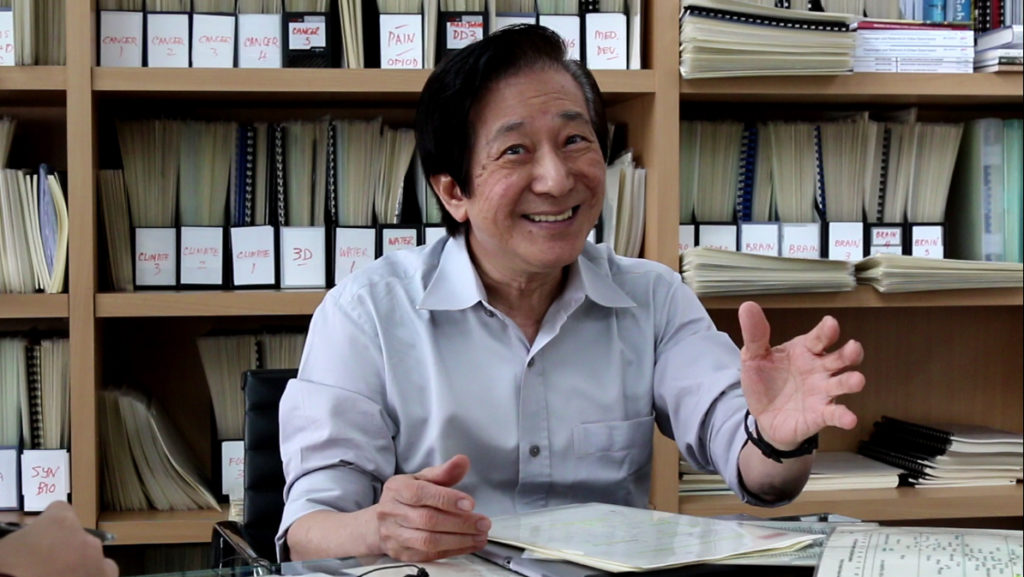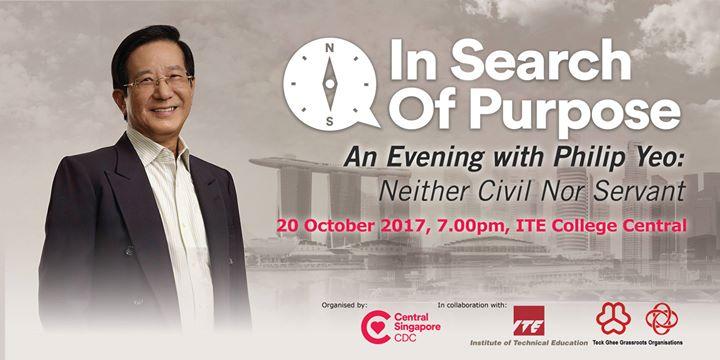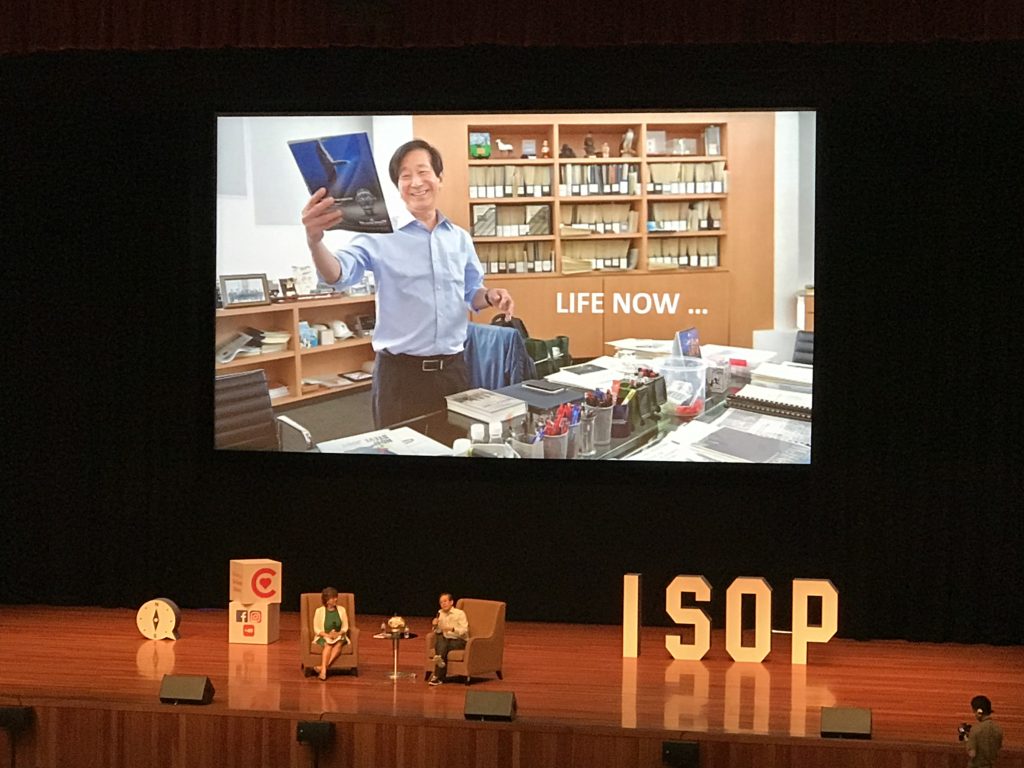
Courtesy of Mothership.sg (photo by Chiew Teng)
Maverick civil servant. Creator of hundreds of thousands of jobs. Iconoclastic foreign investment czar.
Former Chairman of the Economic Development Board (EDB) and A*STAR (Agency for Science, Technology and Research), and current chairman of SPRING Singapore, Philip Yeo is a legendary leader par none.
Endowed with a seemingly endless fount of energy, Yeo has a reputation within and outside the public service as one who does not suffer fools gladly. Famed for his quick wits and machine-gun like conversations, the 71 year old officially retired and now runs companies “as a hobby”.
Yeo’s recent book Neither Civil Nor Servant reignited public attention on this former one-man economic miracle for Singapore. The title has been flying off the bookshelves since it was published, generating much public excitement over what he did (and did not do).
Thanks to an interview session which Philip Yeo gave at Ang Mo Kio ITE hosted by MP Denise Phua of Central Singapore CDC, I picked up quite a few leadership and management tips from this giant of a man.
Let me share what his most significant ones are.

#1 Rules can be broken – if your intent is right
Working with legendary bosses like the late Deputy Prime Minister Dr Goh Keng Swee taught Philip Yeo that bureaucratic work processes may be hacked if the intent is right. While some of the things he did then were “illegal”, they were always done for the greater public good.
Regaling how he maneuvered around government procurement procedures back when he was a young Permanent Secretary in the Ministry of Defence, Yeo shared how he renamed a computer into an “intermediate business machine” back in the 1980s to circumvent procurement rules.
Yeo also eschewed writing long proposal papers to seek purchases. Approvals for purchases were given through 3-minute conversations with his boss. Speed and efficiency was always the essence.
#2 Beg, borrow or steal the best talent
Back in his heyday, Yeo had a reputation for being a “talent thief”. In the early formative years of the EDB, he went to the Public Service Commission (PSC) to “borrow” PSC scholars with engineering degrees to staff the investment promotion agency.
This focus on getting the best young talent in the public sector helped EDB to achieve remarkable results during Yeo’s tenure as Chairman. He reported how the agency achieved 10X improvements in performance then – from bringing in an average of $1 billion investments a year to $10 billion worth of annual investments into Singapore.
Yeo’s deep belief in talent development led him to carve out about $1 billion from A*STAR’s R&D budget to offer PhD scholarships to the brightest Singaporeans. He also hunted for talents around the region, from countries like Malaysia, Vietnam, Thailand and India.
Through these efforts, Singapore now has over 1,400 researchers armed with PhDs here and around the world.
#3 Hire the best, then let them fly
Yeo believe that a strong leader needs to empower the good people recruited by the organisation. The last thing you should do is to breathe down their necks. Instead, you should offer them as much freedom as they need to do the work, and to give them credit.
This management style is elegantly depicted by the metaphor of flying a kite…
“Managing people is like flying a kite, let them fly if they are up there and give them freedom. But if they are down you need to pull them up again.” – Philip Yeo
#4 Hold them accountable for results
Freedom always comes with responsibility.
Known for firing poor performing managers in his organisations, Yeo shared that he did not mind people making mistakes. However, these mistakes must not be the same ones.
“You can make three mistakes, but they must not be the same mistake.” – Philip Yeo
#5 Choose (and be) a good boss
Citing that he was only paid $2,500 a month back when he was a young permanent secretary in his 20s, Yeo revealed that he stayed in the various organisations for long durations because he had good bosses. If he had a lousy boss he would simply walk out.
“You can choose your boss, but you can’t choose your parents.” – Philip Yeo
I guess then the next million dollar question would be this: “Was Philip Yeo a good boss?”
After all, he had a reputation for being one of the toughest bosses in the public service to work for.
#6 Care for staff at all levels
The answer to my question was put to rest when Denise Phua asked Philip Yeo what he would do for non-scholars who may be Diploma or ITE certificate holders.
Yeo related that at one of the companies he was involved with, he noticed that diploma holders who were technicians studied on their own so that they could acquire an engineering degree and improve their prospects.
Back then, the pay difference between a diploma and a degree holder was about $1,000 and these individuals wanted to improve their prospects. Unfortunately, some of the tertiary institutions they chose were not widely recognised.
To improve their lot, Yeo renamed them “assistant engineers” and “senior assistant engineers”, created a single career track for diploma and degree holders alike, and implemented scholarships to allow the best diploma holding staff to study at distinguished universities on company payroll.
#7 Be a Growth Hacker/ Reverse Engineer
From purchasing military equipment from the US to learning about immunology and molecular biology, Philip Yeo was both a lifelong learner and a growth hacker.
In the interview, he unveiled how ST Technologies during its earliest days would take apart the American military hardware it bought, study how it worked, and adopt reverse engineering. Through this growth-hacking process, Singapore could innovate its defence technology. Its interesting to see that the US is now purchasing military hardware from Singapore.
#8 Focus on STEM rather than PPE
Proudly declaring that he is “once an engineer, always an engineer”, Philip Yeo did not think highly of education in soft domains like business and the arts (ie Philosophy, Politics and Economics or PPE) and likened these courses to ones you can conduct “sitting under a coconut tree”.
Instead, he felt that being educated and trained in Science Technology Engineering and Mathematics (STEM) subjects would put people in better stead from an economic perspective. The lab and machine-based skills acquired from these degrees are especially useful if you wished to emigrate or work in a different country. After all, there is a shortage of technical professionals around the world.
#9 “I’m Task Focused, Not Brash for Its Own Sake”
Responding to a question about his legendary fearlessness from the audience, Yeo related an amusing anecdote when he met with former Foreign Minister George Yeo and his family.
Apparently, George Yeo told his daughter then that “Uncle Philip says things which we all want to say but dare not say.”
Having said that, Philip Yeo declared that he did not choose to become a maverick for its own sake, but did so to get the job done. While doing so, he may have inadvertently caused some “collateral damage” to those around him without meaning it.
#10 Robotics, AI and Healthcare Tech is the Future
Asked about the future, Yeo espoused that the biomedical field may not flourish like before due to the high cost of treatments and inability of patients to afford them. The best opportunities may come instead from technologies like robotics and Artificial Intelligence (AI).
He went on to cite an article in The New Yorker on “Dark Factories” which described how a factory in the US trimmed its workforce from 10,000 to 2,000 using automation and mechanisation while improving its yield. This revolution in manufacturing cemented his belief that engineers (needed to design the products, process and machines) and technicians (needed to maintain factory lines) had a much brighter future than unskilled workers.
Beyond that, healthcare technologies like sensors that could allow hospital patients to return home or transit to a step-down care facility may be useful, considering how expensive it was to maintain a hospital bed (approx $1 million) in a public hospital.
#11 Regular maintenance as a key strategy
When asked how he would run SMRT and hopefully avoid the current challenges the transport company faced, Yeo candidly shared that under capacity, lack of maintenance, and becoming public listed (hence needing to generate profits) were the three key issues which plagued the company. Back then, the team did not envisage that the lines would be as heavily used as they are today, and they opted for less costly options in their bid to save money.
Regular maintenance was also not upheld as a discipline back in the past. This was a mistake which Yeo avoided during his stint in Mindef. Back then, he placed special emphasis on maintenance as a vital function in defence.
In view of the historical issues faced by the train lines, it is unfeasible for the current team to unwind all the work that has been done in the past. However, he was confident that we should be able to nail it in time to come.
#12 Singapore =/= China
Right now, everybody is excited about the innovations that are arising from China. From Alibaba to Wechat, high speed Maglev trains to AI, the Middle Kingdom seemed to be leaving the rest of the world in its wake.
When asked if there is anything Singapore can learn from China, however, Yeo responded that much of China’s progress stemmed from two things:
- They have a huge domestic market of about 1.4 billion
- They protected their market from foreign players for a long time, while encouraging their home-grown enterprises to expand abroad
To succeed in Singapore, we cannot follow what China has done. Instead, we need to sell to a global market.
A good example here would be home-grown shoes and fashion accessories brand Charles and Keith. Despite hailing from Singapore, Charles and Keith now hires designers from Italy and Spain, outsources production to China, Vietnam and India, and sells to the world.
#13 What political leaders must do (and why he isn’t one)
Towards the end of the evening’s session, Yeo commented that the number one job for political and government leaders is to create jobs.
By doing so, they can help ensure that there is a good livelihood for their constituents.
When asked why he did not consider joining politics unlike his protege Lim Swee Sway (currently Minister of Manpower), Yeo amusingly retorted that he would probably scold all his constituents! Besides, being a political leader meant that he had to serve all his constituents – this was unlike being the Chairman or CEO of an organisation as the buck stopped there.

Conclusion
Even though I’ve spent almost two decades as a former public officer, I haven’t had the privilege of working directly with Mr Philip Yeo. Together with former Head of Civil Service Lim Siong Guan, however, Mr Yeo has done a tremendous amount of good not only for the organisations which he steered but for Singapore as a whole.
What are your thoughts on Philip Yeo and his approach towards leadership and management? Do you agree with what he said?

Very much like the fourth point yo
Direct, short & sharp. I like.
Just read this article and highly inspired! Esp with the amazing foresight and push for Philip Yeo to lead a team to reclaim 7 islands to create Jurong Island, he is truly a giant of a man!